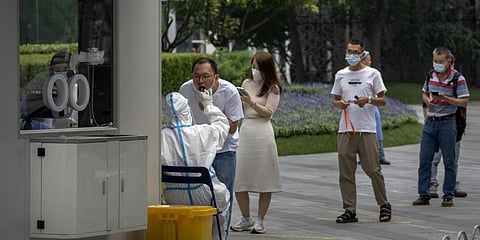

NEW DELHI: Massive multiple-level global failure in responding to Covid-19 led to millions of preventable deaths, says a Lancet Covid-19 Commission report criticising slow and cautious reactions by the governments and even the World Health Organization (WHO) for not warning about the human transmissibility of the virus in time.
The Commission said even the 17.7 million worldwide Covid death numbers are underestimated.
"This staggering death toll is both a profound tragedy and a massive global failure at multiple levels," said the Lancet Commission, led by Professor Jeffrey Sachs, Professor at Columbia University (USA) and President of the Sustainable Development Solutions Network.
The Commission, which critically evaluated the global response in the first two years of the biggest health crisis, noted that the international multilateral system could not deal with a modern pandemic.
The Commission cited widespread prevention failures, problems maintaining transparency, rational decisions, essential public health practice, operational cooperation and international solidarity.
"Too many governments have failed to adhere to basic norms of institutional rationality and transparency, too many people - often influenced by misinformation - have disrespected and protested against basic public health precautions, and the world's major powers have failed to collaborate to control the pandemic," the report said.
Commenting on the role of the WHO, the Commission said that the world health body "acted too cautiously and too slowly on several important matters", which included a warning about the "human transmissibility of the virus" to "declare a Public Health Emergency of International Concern, to support international travel protocols designed to slow the spread of the virus, to endorse the public use of face masks as protective gear, and to recognise the airborne transmission of the virus."
In response to the report, WHO said, "there are several key omissions and misinterpretations in the report, not least regarding the public health emergency of international concern (PHEIC) and the speed and scope of WHO's actions."
However, it added that the Commission report aligns with their commitment to stronger global, regional and national pandemic preparedness, prevention, readiness and response.
Speaking with this newspaper, Dr Srinath Reddy, president of the Public Health Foundation of India and co-author of the Lancet report, said, "The report highlights weaknesses in the global response which arose from faltering translation of science to public policy and lack of global solidarity in areas where it mattered most.
"Delayed warnings, patchy data sharing, late acceptance of aerosol spread and masking advice, super spreader events, vaccine inequity and floods of fake news are among the factors that created waves of the pandemic as the virus and its variants circled the earth. We need to learn from this experience to create efficient and equitable national and global systems for pandemic prevention and response," Dr Reddy added.
The Commission said the report aims to contribute to a new era of multilateral cooperation based on strong UN institutions to reduce the dangers of Covid-19, forestall the next pandemic, and enable the world to achieve the agreed goals of sustainable development, human rights, and peace that governments are committed to pursuing as members of the UN.
Commenting that it has been more than two years into the pandemic, but the search for the origin of SARS-CoV-2 remains incomplete and inconclusive, the report recommended: "intensify the search for the source of the pandemic."
Among the "some important bright spots" in Covid-19 responses, the report cited the "rapid development of vaccines."
The report made several recommendations, including global coordination on efforts to end the pandemic with countries maintaining a vaccination-plus strategy; overall strengthening of WHO; dual tracks to prevent future emerging infectious diseases that look at preventing natural spillovers and research-related spillovers; and a strengthening of national health systems.
It also said that the G20 should plan and implement a 10-year effort, with accompanying financing, to ensure that all WHO regions - including the world's lower-income regions - can research, develop, produce, and distribute all of the essential tools for pandemic control, including tests, diagnostics, vaccines, therapeutics, PPE, and human resources for health, among others.
It is estimated that around $60 billion would be required annually (0.1 per cent of the gross domestic product of high-income countries, which the IMF estimates to be about $60 trillion in 2022) to achieve these goals.